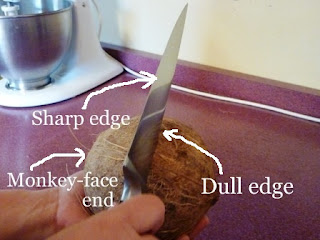Thanks to a diversion to the Philippines because of a tropical storm, we'd been traveling for at least a day and didn't arrive at our destination until quite late. Still, after checking into our room, the first thing I did was run out to the hotel parking lot and grab as many coconuts as I could carry. I've been koo-koo for coconuts ever since.
Nowadays, when I'm picking coconuts at the store (not the young green ones, but the brown kind that look like a monkey head), I get a lot of questions about what to look for. I'd love for every one to share my joy, so I'm sharing a few tips.
 |
| I think it looks like a capuchin monkey -- or maybe a lemur, at any rate |
- Make sure there are no cracks, holes, or breaks.
- Look for any signs of mold or mildew. I think it should go without saying, but you don't want that.
- Especially check around the "monkey face." Make sure that the "monkey face eyes" are not soft or moldy or spotty. I've noticed that this is where the coconut palm roots first appear. Often, I've found soft spots indicate that the roots have started forming.
- Shake the coconut. You want to hear lots of water inside. More fluid means a younger, softer, moister coconut.
Opening a Coconut
This is how my Chamorro teacher taught us to open coconuts.
- Hold the coconut in one hand.
- With the other hand, use a heavy knife or cleaver to strike the coconut along its middle. I like to use the heaviest part of the knife, near the handle.
Safety Tip: Hit with the dull side of the blade. Do not use the sharp side of the blade or you'll wreck your knife and do yourself an injury.
Note: This is not the time to be shy. Polite tapping and knocking aren't going to work. Be decisive and firm in striking your blows.
Note: Instead of a knife, you could use the nail remover on a hammer, striking so that the prongs land in a line along the coconut's equator just the way a knife would. If you use the "hammering" end, you can bash the coconut into tiny bits where you strike it.
- After striking, turn the coconut slightly in your hand and whack it again.
- Continue in this fashion, striking a blow at the coconut's equator and then turning. Do this until you see a crack.
- Drain the coconut water through the crack into a container. You can drink this if you want.
- Continue striking/turning to open the coconut completely.
If you want to learn how to grate coconut meat easily, check out Part 2: Shredding/Grating Coconut.
1When I get a bad coconut, I put it out for the birds and squirrels. They don't seem to mind.



0 comments:
Post a Comment